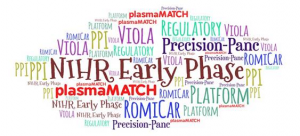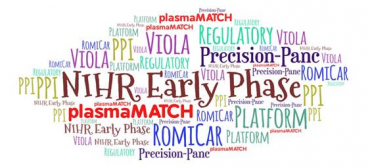NIHR Statistics Early Phase Trials Group Meeting 2019
Category: Early phase clinical trials

UPDATE: Information about the meeting can be found in the newsletter and slides may be found below.
The next meeting of the NIHR Early Phase Trials Group will be held on 28th February 2019 at Birmingham University.
This meeting will bring together statisticians, clinicians, trial managers and regulator to discuss recent advances in the practical implementation of efficient model-based dose-finding designs in early phase trials. It will also cover exciting and innovative real-world multi-arm phase platform designs in action.
The event is free with lunch and refreshments provided. It is expected to be very popular and there are limited places available.
Programme
09:30 – 09:45 Registration and coffee/tea/pastries
09:45 – 09:50 Introduction and welcome
Session 1: Implementation of Phase 1 Model-Based Adaptive Design
09:50– 10:30 Life Journey of a Continual Reassessment Method Trial: Design, Conduct and Reporting
- Speaker: Dr Christina Yap, Reader in Biostatistics and Clinical Trials, Cancer Research UK Clinical Trials Unit (CRCTU), University of Birmingham
I will recount the challenges, heartaches, lessons learnt, and the joys of developing and implementing my first CRM trial, VIOLA, from initial conception to final publication (Yap et al 2017, Craddock et al, in press). Would I do it again?
10:30 – 11:00 CRMs from a clinician perspective: Continual Reassessment or Continual Stress
- Speaker: Dr Graham Collins, Haematology consultant and lymphoma lead, Oxford University Hospitals
How statisticians and clinicians approach CRM models can be very different. This talk seeks to explain a clinician perspective – the benefits the model can give in enabling a swifter and more efficient design, but also the possible added stresses. I will mainly use the RomiCar trial as the basis for discussion. The aim is to foster understanding between clinicians and statisticians in order to enable better team working.
11:00 – 11:20 Refreshment Break
Session 2: Early Phase Multi-arm (Platform) Designs in Action (Chair: Prof Christopher Weir, University of Edinburgh)
11:20 – 11:30 An introduction to basket, umbrella and platform designs and how statistics can help
- Speaker: Prof Cindy Billingham, Professor of Biostatistics, CRCTU, University of Birmingham
11:30 – 12:00 Precision Panc: The next generation therapeutic development platform for pancreatic cancer
- Speaker: Dr David Chang, Reader and Honorary Consultant Pancreatic Surgeon, University of Glasgow
Precision-Panc is a therapeutic development platform for pancreatic cancer, that brings in the continuous forward and backward learning of “discovery”, “preclinical” and “clinical” development. The principle of Precision-Panc will be presented with examples of translating deep science discovery into novel clinical trial design
12:00 – 12:20 Practical challenges of delivering a platform trial from a trial management perspective
- Speaker: Ms Claire Snowdon, Deputy Director & Operations Director, ICR Clinical Trials & Statistics Unit, The Institute of Cancer Research
I will focus on the logistical challenges of delivering a single protocol screening platform with multiple incorporated treatment cohorts, with particular reference to financial, resource and regulatory aspects, using plasmaMATCH as an example in my talk.
The UK plasma based Molecular profiling of Advanced breast cancer to inform Therapeutic CHoices (plasmaMATCH) Trial:
A multiple parallel cohort, open-label, multi-centre phase IIa clinical trial aiming to provide proof of principle efficacy for designated targeted therapies in patients with advanced breast cancer where the targetable mutation is identified through ctDNA screening
12:20 – 12:40 Discussion with the panel: Cindy, David and Claire
12:40 – 13:40 Lunch
Session 3: Regulatory Perspectives (Chair: Dr Christina Yap, CRCTU, University of Birmingham)
13:40 – 14:40 Regulatory perspective of early phase I/II designs, including basket, umbrella and platform designs
- Speaker: Dr Khadija Rantell, Statistical Assessor, Medicines and Health Care Products Regulatory Agency (MHRA)
Within the EU regulatory system, scientific advice is available to support the qualification of innovative development methods for specific intended use in the context of research and development into pharmaceuticals. MHRA supports innovative trial designs (adaptive trials, basket, umbrella, and platform designs) by engaging with sponsors to assist with innovative protocol designs and facilitating efficient approval and amendment to such trials. The MHRA are members of the Modelling and Simulation Working party (MSWP) at the EMA who assess modelling methodology and support innovation in areas like first-in-man or dose finding trials. The MHRA also collaborate with other organisations to promote best methodologies in the set up and delivery of innovative trials. Based on MHRA’s experience in early phase trials, this talk will highlight current trends in dose-finding methodology, and it will also discuss the key challenges with master protocols (e.g. lack of common terminology) and the statistical considerations with such trials, e.g. independence of sub-studies, shared control groups, and pooling of data across sub-studies.
14:40 – 15:10 Research team and PPI perspectives on Early Phase Trials Designs
- Speakers: Mrs Aimee Jackson, Senior Biostatistician and Dr Christina Yap, Reader in Biostatistics and Clinical Trials, CRCTU, University of Birmingham
15:10 – 15:50 Update on past activities. Identify future training courses/projects.
- Speaker: Dr Simon Bond, Senior Statistician, Cambridge Clinical Trials Unit, Cambridge University Hospitals NHS Foundation Trust
A key output from the group is the recently published paper ‘How to design a dose-finding study using the continual reassessment method’, which will be introduced and then we will discuss and plan how to ensure the paper is communicated widely and effectively in the clinical trials community. Future objectives emerging from the day’s talks and workshops will be agreed.
15:50 – 16:00 Closing remarks
- Speakers: Drs Simon Bond and Christina Yap

